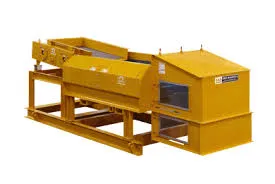

Dec . 12, 2024 11:31 Back to list
The Importance of Aluminum Can Recycling Plants
Aluminum can recycling plants play a crucial role in the sustainable management of materials and energy in our modern society. Given the increasing global concern over environmental issues, these facilities are essential in promoting recycling practices that significantly reduce waste and conserve natural resources.
Aluminum is one of the most commonly recycled materials around the world, primarily due to its lightweight nature and the vast applications it has in everyday products. From beverage cans to airplane parts, the versatility of aluminum is unmatched. Recycling aluminum is not only beneficial for the environment but also for the economy. The process of recycling aluminum saves about 95% of the energy required to produce new aluminum from raw materials. This energy savings translates into lower costs for manufacturers and, ultimately, consumers.
The recycling process begins at aluminum can recycling plants, where cans collected from various sources—such as residential, commercial, and industrial settings—are brought for processing. At the plant, the cans are sorted, cleaned, and shredded into small pieces. This step is crucial as it ensures that contaminants, such as plastic labels and residual contents, are removed. Once the aluminum is sorted and processed, it can be melted down into ingots.
Melting aluminum requires significantly less energy compared to producing it from bauxite ore, which involves mining and refining processes that are both energy-intensive and environmentally damaging. The melting process in recycling plants only requires about 5% of the energy utilized in primary aluminum production. This efficiency is pivotal in minimizing the carbon footprint associated with aluminum production.

Recycled aluminum can be transformed back into new products quickly. The time frame for recycling a can into a new one can be as short as 60 days. This rapid turnaround reinforces the concept of a circular economy, where products are reused and recycled continuously, thereby reducing the volume of waste in landfills.
Additionally, aluminum recycling plants contribute to job creation and economic development. They provide direct employment in the facility itself and also stimulate jobs in the collection and transportation of recyclable materials. The robust recycling industry not only aids in alleviating the environmental burden but also boosts local economies through the creation of green jobs.
Despite the benefits, aluminum recycling does face challenges. Consumer awareness about recycling practices varies widely, and contamination in recycling streams can lead to inefficiencies in the recycling process. To address these challenges, many recycling plants are investing in advanced technologies to improve sorting and processing efficiency. Furthermore, public education campaigns are crucial in raising awareness about the benefits of recycling aluminum and the environmental impact of waste.
Another aspect worth mentioning is the legislative support for recycling initiatives. Governments worldwide are implementing policies that promote recycling, encourage sustainable practices, and improve recycling infrastructure. Such initiatives often include incentives for both consumers and businesses to participate actively in recycling programs. These policies can lead to increased recovery rates and better recycling outcomes.
In conclusion, aluminum can recycling plants are vital components in the quest for sustainability. They not only help alleviate the pressure on natural resources but also create economic opportunities and foster environmental stewardship. As society continues to evolve toward greener practices, the role of these recycling plants will only become more significant. By investing in aluminum recycling and supporting these plants, we can ensure a healthier planet for future generations while reaping the economic benefits of a circular economy.
Latest news
Troubleshooting Common Eddy Separator Problems
NewsJul.04,2025
The Role of Metal Recycling Plants in Circular Economy
NewsJul.04,2025
The Impact of Recycling Line Pickers on Waste Management Costs
NewsJul.04,2025
Safety Features Every Metal Shredder Should Have
NewsJul.04,2025
How Industrial Shredders Improve Waste Management Systems
NewsJul.04,2025
How Cable Granulators Contribute to Sustainable Recycling
NewsJul.04,2025